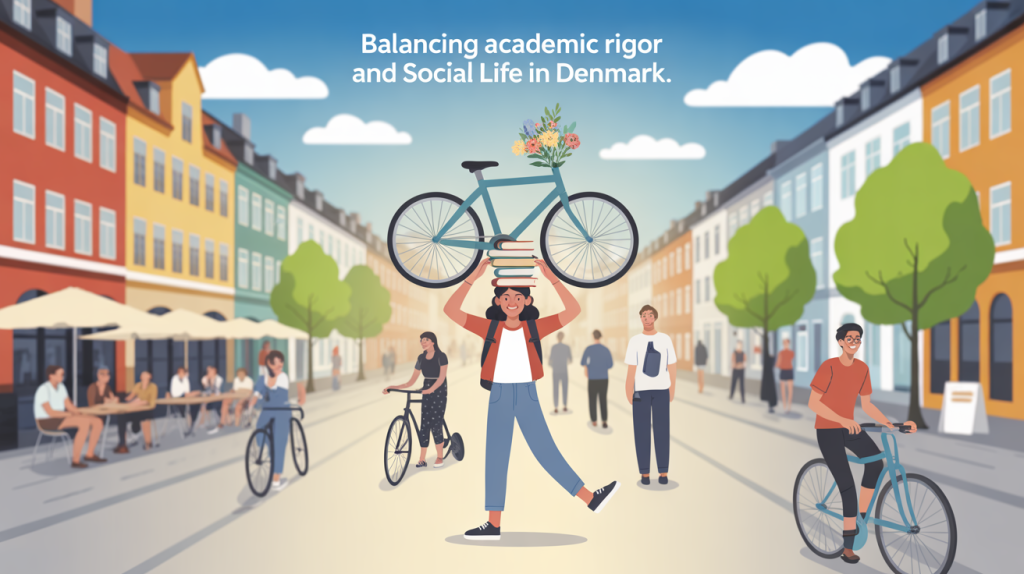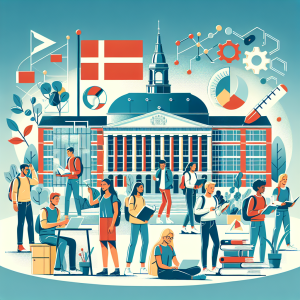Balancing Academic Rigor and Social Life in Denmark for International Students
Table of Contents
Academic Rigor in Denmark
Denmark is renowned for its innovative approach to higher education, fostering an environment that encourages critical thinking, creativity, and collaboration. Here are key aspects of the academic rigor that students can expect:
Innovative Learning Environment
Danish higher education institutions focus on an innovative and progressive learning model that prioritizes student engagement. Courses are often interdisciplinary, allowing students to explore various perspectives and develop skills essential for today’s job market.
- Active Learning: Students are encouraged to engage actively in discussions, projects, and problem-solving tasks rather than simply absorbing information.
- Collaborative Projects: Teamwork is a fundamental part of the educational process, reflecting real-world situations where collaborative skills are indispensable.
English-Taught Programs
Many programs, particularly at the master’s level, are offered in English, making Denmark a highly accessible destination for international students.
- Diverse Academic Offerings: A wide variety of courses across disciplines are available in English, allowing students from different backgrounds to take part in academic life without facing language barriers.
- Quality Education: Danish institutions maintain high academic standards, ensuring that international students receive a quality education partnered with stimulating class discussions and hands-on experiences.
Balancing Academic and Social Life
Successfully managing both academic and social commitments requires intentional strategies. Here are actionable tips for international students:
1. Time Management
Effective time management is foundational for maintaining balance. Here’s how students can organize their schedules:
- Create a Timetable: Incorporate study sessions, social events, and personal time into a structured timetable to visualize commitments.
- Set Priorities: Identify urgent tasks and allocate sufficient time for both academic assignments and social activities.
2. Participate in Campus Events
Engaging in campus activities is vital for building a social network:
- Explore Local Culture: Attend cultural events to immerse in Danish traditions and meet other students interested in similar experiences.
- Network Building: Regular participation in events fosters familiarity and can lead to lasting friendships, as well as professional connections.
3. Join Student Clubs and Organizations
Many universities offer a variety of clubs and organizations catering to a range of interests, providing students the opportunity to:
- Find Like-Minded Peers: Joining clubs aligned with personal interests helps create strong bonds with fellow students.
- Develop Skills: Participation in clubs can enhance essential skills like leadership, teamwork, and organizational abilities.
4. Cultural Integration
Understanding Danish culture is pivotal for successful social interactions. Here are a few cultural insights:
- Punctuality: Valuing time is a key trait in Denmark. Being punctual is considered respectful and is important in both academic and social settings.
- Openness: Danes are generally approachable and appreciate meaningful discussions; students can leverage this to forge new friendships.
Conclusion
Denmark presents an unparalleled approach to education that combines rigorous academic programs with a vibrant social atmosphere. By effectively managing their time, participating in campus life, joining clubs, and embracing Danish culture, international students can find the perfect balance that enhances their educational journey.
Take the Next Step with Study in Denmark
At Study in Denmark, we are dedicated to supporting international students in navigating their educational experiences in Denmark. Whether you represent a recruiting agency, educational institution, or are an individual looking to understand more about studying in Denmark, contact us for guidance and partnership opportunities. Together, we can pave the way for future international students to thrive in Denmark’s academic and cultural landscape.




Social Life and Campus Environment
Denmark boasts a rich and inclusive social life that complements academic pursuits. Here’s what students can expect regarding campus life:
Campus Life
Danish universities are known for their vibrant campus environments equipped with various amenities, including:
Social Activities
Universities actively foster social connections through a plethora of activities designed to engage students outside the classroom.